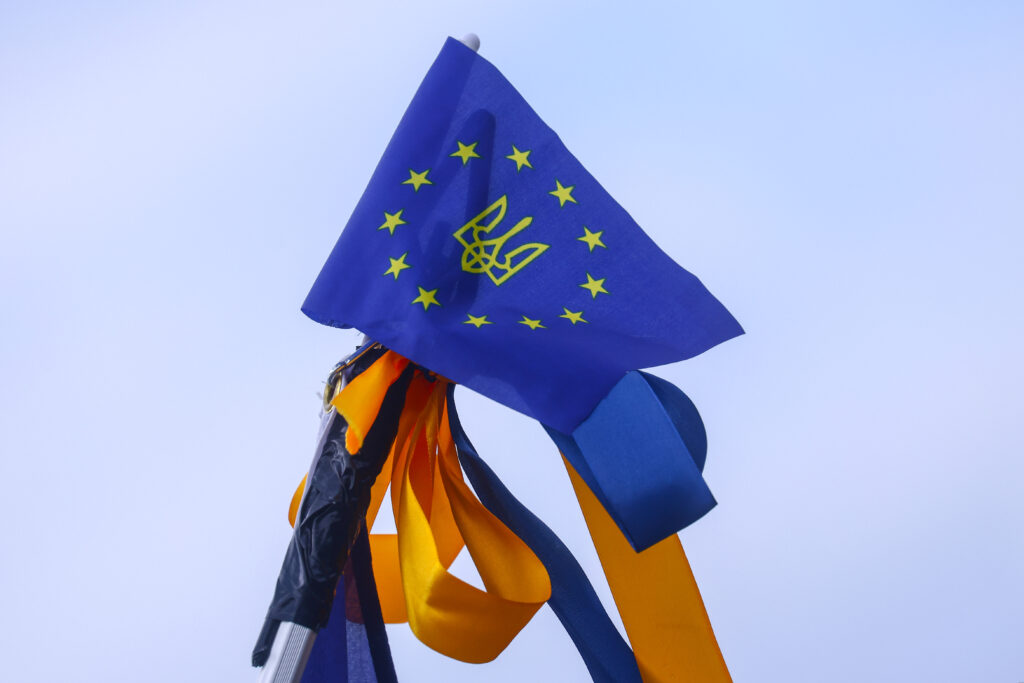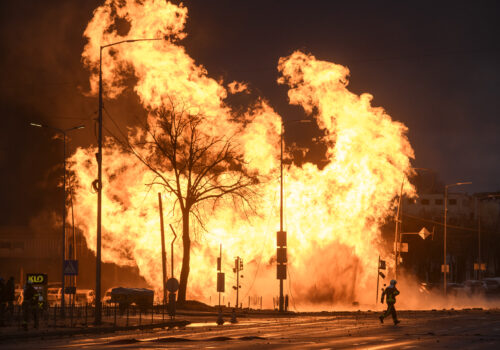In the first days of 2024, the Ukrainian authorities unveiled a vision for the future of the country’s State Customs Service as an emerging eastern customs border for the entire European Union. This ambitious goal aims to build on Ukraine’s traditional status as a gateway nation between the EU, Asia, and the Middle East. It will form an important element within Ukraine’s broader EU integration, and will play a key role in the ongoing reform of the country’s customs authorities.
Following Russia’s full-scale invasion in February 2022, Ukraine’s State Customs Service moved to a war footing. Initially, the top priorities were maintaining control over the country’s customs service amid Europe’s largest invasion since World War II, and ensuring the physical safety of staff members. Many employees had to be evacuated from front line areas or regions under Russian occupation. Meanwhile, around five percent of customs service personnel joined the Ukrainian Armed Forces.
Despite these unprecedented challenges, customs services in areas unaffected by hostilities continued to operate with minimal disruption. Staff were redeployed to western and southern Ukraine to address rising demand, while clearance procedures were streamlined. With Russia blockading Ukraine’s Black Sea ports, cargoes were increasingly transported to the EU via road and rail.
In response to the wartime conditions in Ukraine, new measures were introduced making it possible to process customs declarations for humanitarian aid online. Steps were also taken making it easier to import items for military use such as radios, binoculars, body armor, and drones. Customs service officials continued to operate in southern Ukraine’s Black Sea ports in the Odesa region, despite the dangers posed by regular Russian missile and drone strikes.
Stay updated
As the world watches the Russian invasion of Ukraine unfold, UkraineAlert delivers the best Atlantic Council expert insight and analysis on Ukraine twice a week directly to your inbox.
Even with these adjustments in place, customs revenues in 2022 inevitably reflected the wider damage done to the Ukrainian economy by Russia’s invasion, with total revenues representing just 56.9 percent of the annual target. This led to a sharp decline in State Customs Service contributions to the national budget, which fell by 32.7 percent, a figure that was more or less in line with the overall drop in Ukraine’s GDP during the first year of the invasion.
Amid the destruction of Russia’s full-scale invasion, Ukraine continues to invest in customs infrastructure upgrades that are designed help facilitate international trade and improve the country’s economic outlook. During the past year, construction work on two border crossings with Romania has been completed. Ukraine is also currently expanding join control projects along the border with Moldova, while aligning procedures with European standards.
These initiatives are part of the Ukrainian State Customs Service’s broader European integration efforts. Ukraine was officially recognized as an EU candidate country in summer 2022, with EU leaders confirming the decision to begin membership talks in December 2023. The reform of the customs service will be integral to Ukraine’s further integration into what remains the world’s wealthiest trading bloc.
Eurasia Center events

As part of the assessment process prior to the recent decision on EU membership talks, the European Commission positively assessed Ukraine’s customs reform progress so far. The Ukrainian Customs Code now largely aligns with the European Union’s own Customs Code, including in key areas such as transit, guarantees, and intellectual property rights.
During the wartime period, Ukraine has ratified the Convention on Common Transit Procedure, a crucial step toward EU membership. The country has also launched a national node of Europe’s Common Communication Network, connected to the New Computerized Transit System (NCTS), and linked up to the Joint Telecommunications Network of EU member states within the European Transit System.
The adoption of a new Ukrainian Customs Code, fully aligned with the EU’s own Customs Code, aims to expedite trade by implementing customs simplifications while establishing a robust defense against smuggling. Implementation will strengthen the law enforcement role of the State Customs Service and enhance cooperation with European colleagues.
The ongoing reform of Ukraine’s customs service and the implementation of EU standards are fundamental for the country’s further European integration. These parallel processes will also strengthen Ukraine’s credentials as a natural customs partner on the EU’s eastern frontier. As Ukraine progresses toward membership of the European Union in the years ahead, the country will be increasingly well positioned to build on its geographical location and play a more prominent role as an eastern customs hub for EU markets.
Vladyslav Suvorov is Deputy Chief of Ukraine’s State Customs Service.
Further reading
The views expressed in UkraineAlert are solely those of the authors and do not necessarily reflect the views of the Atlantic Council, its staff, or its supporters.

The Eurasia Center’s mission is to enhance transatlantic cooperation in promoting stability, democratic values and prosperity in Eurasia, from Eastern Europe and Turkey in the West to the Caucasus, Russia and Central Asia in the East.
Follow us on social media
and support our work
Image: EU flag with Coat of Arms of Ukraine is seen during 'Raising the Flag for Ukraine in NATO' event and concert in Vilnius, Lithuania on July 11, 2023. President Zelenskyy arrived to Lithuania to attend NATO Summit in Vilnius and support Ukraine in becoming a member of NATO (Photo by Beata Zawrzel/NurPhoto)




